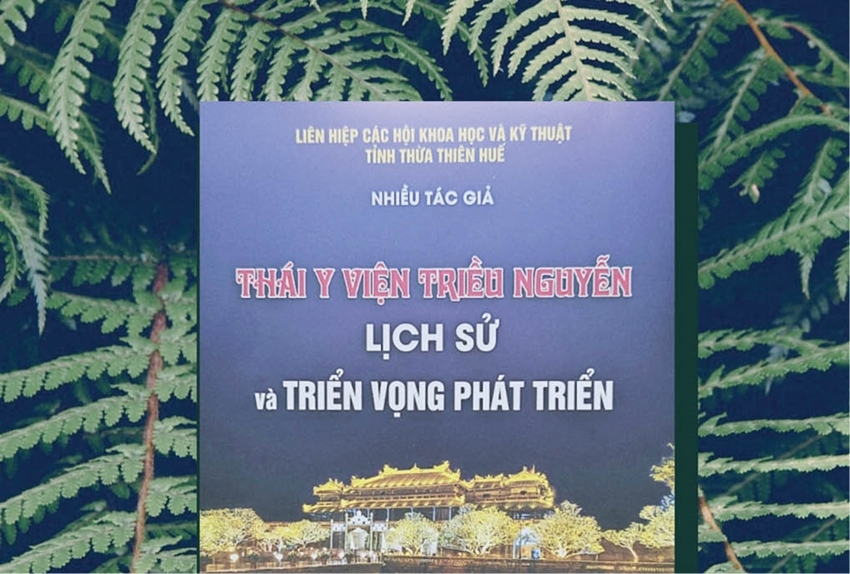 |
| The book cover of “The Imperial Medicine Institute of the Nguyen Dynasty: History and development prospects” |
With 40 articles, the book is divided into two sections, including: the historical value of the Imperial Medicine Institute of the Nguyen Dynasty; and the Imperial Medicine Institute of the Nguyen Dynasty: Development prospects.
In the first section, with 20 articles, the writers focus on researching the history of formation, construction and development, activities running and tasks of the Imperial Medicine Institute of the Nguyen Dynasty through ancient bibliographic sources, historical documents, remedies, as well as methods of treatment and health protection according to traditional medicine methods.
According to historical documents, the Imperial Medicine Institute was an agency that appeared from very early in the country's history. Its predecessor was the Imperial Medicine Department (Ty Thai y), established during the Ly Dynasty. During the Tran Dynasty, the government upgraded the Imperial Medicine Department into the Imperial Medicine Institute, with royal physicians specializing in medical examination and treatment for the king, royal family, and mandarins. Then, the subsequent feudal dynasties continued to maintain and develop this important medical agency.
In the Nguyen Dynasty, in 1802, after ascending the throne, Emperor Gia Long immediately ordered the "recruitment" of surgical doctors. This was considered the time when Emperor Gia Long tried to call, recruit, and summon famous physicians in the public to work in the Imperial Capital. In the third year of Gia Long's reign (in 1804), the Imperial Medicine Institute was officially established in Hue Imperial Capital and quickly went into operation, opening an important turning point in the historical development process of the national medicine.
In addition to being a specialized agency in charge of taking care of the health of the king, royal family and the royal servants, the Imperial Medicine Institute also provided medical examination and treatment for mandarins in the Imperial City, those who served at temples, mausoleums, soldiers, and civil servants working at royal construction sites, as well as participating in fighting epidemics in localities, and opening medicine schools.
The Imperial Medicine Institute also coordinated with the Imperial kitchens (Ngu Thien phong) to offer the King the food ensuring the best health, especially dishes that were not compatible with each other, which might cause negative health effects for the King.
While the Imperial Medicine Institute specialized in medical examination and treatment for the king, the royal family, the royal servants, the court officials and the management of the health sector of the whole country, the health care work was carried out by the talents and virtues of physicians and families with a famous tradition of practicing oriental medicine in the social community. In Thua Thien Hue, a number of families with the tradition of being physicians are the Dang family in Thanh Luong village, the Than family in Thuy Bieu village, the Ho Dac family in An Truyen village, and the Le Van family in La Khe village, etc. Besides, villages with oriental medicine traditions are Thach Binh village, Khuong Pho (Quang Dien), and Luong Loc village (Phu Vang), etc.
In the second section, with the topic “the Imperial Medicine Institute of the Nguyen Dynasty: Development prospects”, the writers propose solutions to effectively implement the work of preserving and promoting the value of the Imperial Medicine Institute of the Nguyen Dynasty for the development of economy, tourism and culture.
This part focuses on clarifying directions, as well as basic opportunities and challenges in developing tourism combined with health care, based on the heritage value of the Imperial Medicine Institute. In addition, the articles recommend effective investments in the team of quality doctors and pharmacists to serve visitors more effectively. It is necessary to supplement the training of traditional medicine doctors with knowledge and skills to examine, diagnose, and treat patients with traditional medicine, combining traditional medicine with modern medicine. In addition, this team of doctors not only knows about the treatment, but also knows how to ‘do tourism activities’.
Along with that, local authorities need to create favorable conditions for businesses operating in the field of medical tourism to develop this type of tourism, and need to maximize local advantages to develop this type of resort tourism. This direction will solve the employment pressures, help doctors improve their skills, and turn resort tourism combined with medical treatment into a spearhead industry of the locality.